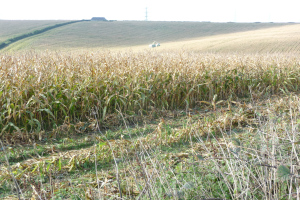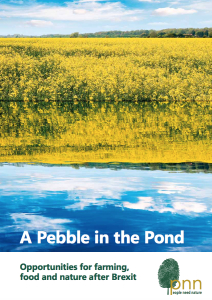Wanted to share this short film about young crofters in Scotland figuring out ways to gain access to land, to practice small scale agriculture and local food production. Passionate, inspiring people.
New Year’s Resolution to experience and express gratitude– I’m grateful to people who work really hard on the issues I deeply care about. Miles King is one of them. Here’s what he says about Brexit opportunities.
I’m delighted to be able to tell you about this new report which is published today. It’s the first People Need Nature policy report – A Pebble in the Pond: Opportunities for farming, food and nature after Brexit. You can download it here.
Here’s the summary:
As England prepares to leave the EU we have a once in a lifetime opportunity to change the way we support England’s land managers. This report shows how leaving the EU will enable us to channel money from the public purse to land managers in such a way that they can both produce food, help nature and provide all the other benefits society needs.
The last forty years of farm subsidies from Europe via the Common Agricultural Policy has contributed to a dramatic decline in nature on farmland – land that covers three quarters of England. The vote to leave the EU means we…
View original post 382 more words
We need to keep informed about agriculture oriented towards energy production. In the case of maize in Britain, there’s also a terrible association with soil runoff during excessive rain events that contributes to flooding, as in this piece by George Monbiot with it’s quite shocking video component. A responsible climate change policy would take into account both the importance of good land management (as nudged or not by subsidies) and actual carbon figures, which Miles King, in the post shared below, discusses so clearly.
 Biogas Maize is now grown widely in the Dorset Area of Outstanding Natural Beauty © Miles King
Biogas Maize is now grown widely in the Dorset Area of Outstanding Natural Beauty © Miles King
Maize grown specifically for Anaerobic Digesters to produce “biogas” is an increasingly common crop in England, especially in the South West. The area under Biogas Maize increased by 55% in 2016 compared to 2015, to 52000ha. The National Farmers Union set a target of 200,000ha of land under biogas Maize back in 2011, so they are 25% of the way to their target.
Maize is a very environmentally damaging crop, probably the most environmentally damaging crop grown in the UK. Why then is so much of it being grown? Because the Government pays not one, but two subsidies for it to be grown – the generous single payment (now over £200 per hectare annually) for anyone who owns farmland; and on top of this there are a range of payments including the Renewable…
View original post 474 more words

I’m pleased to be on the shortlist for a BOOM Award in the category of Best Food Blog.
Here’s the list!
[POSTDATE: Guess what, I made top 3!!!!!]
We’ll find out the results on 11th May. I’m more committed to writing about a wider social-cultural-political vision of food than what we think of as standard food blogging, though of course I am honoured to be recognised by the Soil Association because I admire so much of the work it does.
Organic as “lifestyle” might seem a choice of privilege or taste, but if you take a look at the range of issues encompassed in Soil Association campaigns, it’s clear that the dominance of chemical agriculture has critical, wide-ranging implications.
Some of their current campaigns: Read the rest of this entry »
Reblogging a really good round-up of social and ecological issues pertinent to British farming at the current moment of climate change and CAP subsidies. Am sure there’s lots that readers would consider arguable -some real challenges to the status quo – but well worth a read and a share. Would be very interested to hear responses.
Food and the Environment
A guest post from environmental campaigner and writer Miles King, who blogs on nature here.
We all need to eat and most of us want to see at least some of our food produced in Britain, if it can be. Who knows, with climate change already with us, English banana crops might not be so ridiculous an idea in 50 years.
Self sufficiency is not a realistic prospect and it should not even be considered as an appealing principle to aspire to – what is the point of Britain producing sugar beet with a higher carbon and environmental footprint than the cane sugar we import from countries who benefit from its trade?Especially when that Beet has a special subsidy and tariff system to protect its producers from competition.
Currently food production in Britain is subsidised through the Common Agricultural Policy to the tune of around £200…
View original post 2,022 more words
I just happened upon this wonderful illustrated history of Johnny Appleseed. Enjoy!
And here’s something that makes an interesting (and convincing) contention: Johnny Appleseed and the Golden Days of Hard Cider.
A fascinating, very informative video about Andrew Whitley’s compelling endeavours “to rebuild nutritional quality and local self-sufficiency of the Scottish bread supply.” I love his baking book Bread Matters, and now hearing him talk about “diversity in adversity” and agricultural resilience.
Andrew Whitley is a campaigning organic baker known for starting the Village Bakery in Melmerby in the 1970s and latterly as co-founder of the Real Bread Campaign. His book Bread Matters is credited with ‘changing the way we think about bread’ by Sheila Dillon of the BBC Food Programme and his business of the same name provides artisan bakery training. Now he’s followed his interest in bread back to its roots by farming in the Scottish borders – using agroforestry approaches, inspired by the work of Prof Martin Wolfe at Wakelyns. He is also experimenting with some 70 varieties of wheat, spelt, emmer, rye, oats and barley, including varieties that used to be grown in Scotland, some obtained from the Vavilov Institute in Russia – as he explains in the video tour of his farm.
With his wife and co-director Veronica Burke he is pioneering a new project…
View original post 278 more words
Found this trailer here. Looking forward to the film.
The organisation GRAIN has put together some resources around the politics of industrial food production and its contribution to climate change. GRAIN is “a small international non-profit organisation that works to support small farmers and social movements in their struggles for community-controlled and biodiversity-based food systems” — an agroecology point of view.
In the run-up to the Paris conference on Climate Change in December, they’ve written this report on the central role fertiliser companies play in the discussions concerning agriculture and climate change. “Climate Smart Agriculture” has become a key phrase and concept that is about the appropriation of some of the language of Agroecology — many facets of CSA are expressed in Orwellian DoubleSpeak and we all need to educate and organise around this– the greenwashing is chilling.
So many small environment and agriculture organisations around the world are working to fight the dominance of the Climate Smart Agriculture discourse in UN forums. This is an important letter hundreds of such groups have signed.
This past week, I was pretty excited when I spied the first flower on my cucumbers and a little bud behind it. Unfortunately, I haven’t noticed any bees.
According to a new report co-authored by researchers at Stanford, Princeton and Berkeley, Earth has entered its sixth period of mass extinction. Within just three generations, pollination by bees could be something kids only read about in textbooks (unless they live in Texas). You can read the full report here or an overview of it here.
While some people may not mind living in a world free of broccoli, cauliflower and lima beans, they will probably miss hazelnuts, melons, squash, cucumbers, lemons, limes, strawberries, persimmons, apples, avocados, apricots, cherries, almonds, cocoa, grapes and on and on. We’ll still have corn and wheat though, which do not require pollinators, until blight tears through these non-diverse and thus vulnerable…
View original post 631 more words
Reallyreallyreally worth a read, and please share around . Francis is an amazing, righteous Pope, and though I don’t identify with the religious stuff in any religious way, I feel the spiritual truth of it all very deeply. As much as we want the people to lead and the leaders to follow, it feels a relief this time for a true leader to lead from a place of such integrity, truth and vision.




